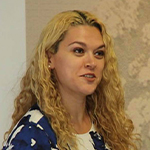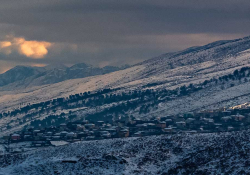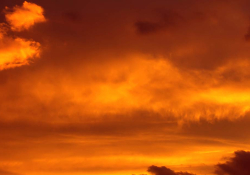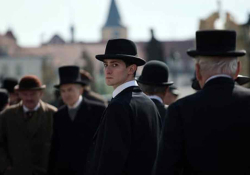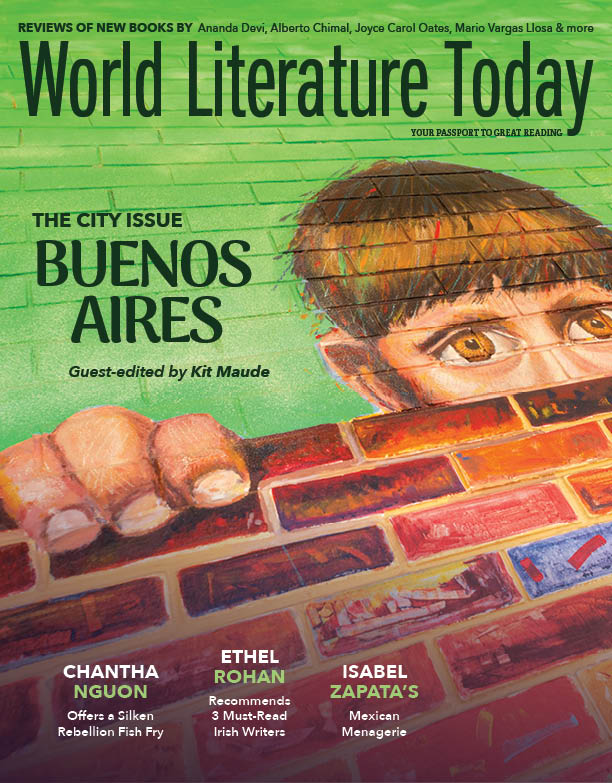Reading Dostoevsky Now, from the Margins
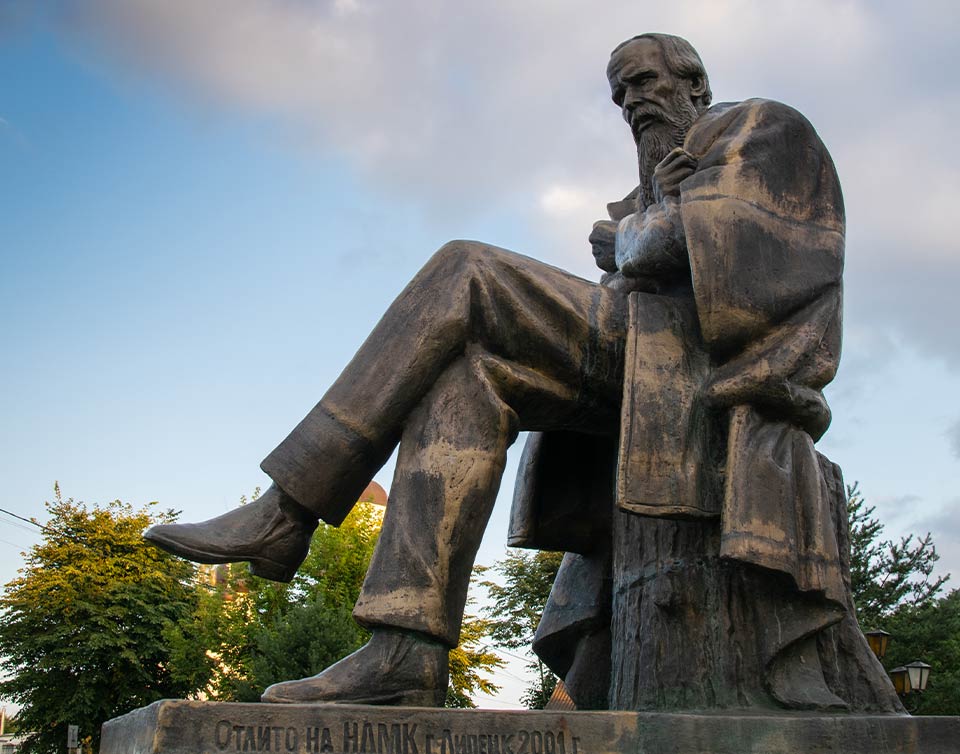
Against increasing calls to “cancel” Dostoevsky due to the Russian nationalism espoused in his writings, Ani Kokobobo chooses to hold on to a Dostoevsky of the margins, a Dostoevsky who tests us ethically when we rationalize horrible means to justify an imagined greater good.
As a scholar and reader of literature, I have never seen books as divorced from the present or from our subjective experiences. Books are personal. The subjective intimacy that emerges out of reading is such that books grow part of who we are. When we reenter the same book, we hark back to earlier selves that preserve aspects of who we were. As a scholar of literature, I inevitably find myself reentering the same literary universes over and over, with visitations from past selves in the margins, bemusing in their enthusiasm, insight, and the occasional pedestrian underlining. However historically removed from the present, literature speaks directly to our present personal and geopolitical realities. As a person who doesn’t keep a diary, I find some of my most pointed personal opinions in the margins of books. I see my own past memorialized in those margins, while my realities speak back to the text, confronting the urgency of the past with the sometimes-louder urgency of the present.
For me, the current Russian violence in Ukraine has been howling loudly at the pages and margins of Fyodor Dostoevsky ever since February 24, 2022. Many of his words denounce his other words, in an excruciating cacophony of voices that shows no signs of coming to a reconciliation. Some Dostoevsky passages may seem to enshrine Russian nationalism and “greatness,” furthering the Russian government’s pernicious global and political agendas, while others morally shake us to the point of recoiling from everything that’s happened and continues to happen in Ukraine. Reading Dostoevsky now, I find myself furious with parts of his writings, processing the world through Dostoevsky and yet also knowing many of his ideas have been made complicit in what is happening. And this, all the while coming into direct confrontation with the me in the margins who read Dostoevsky ten or twenty years ago, the me who became a scholar because of Dostoevsky.
I cling to Dostoevsky for the complexity, the multivalence and multivoicedness, the contradictoriness, the concealment and overexposure, the embodied subjective messiness.
Twenty years ago, Dostoevsky was at the center of my own liberal arts journey as a student. I’ve written primarily about Tolstoy in my scholarly career, but studying Dostoevsky is how I learned to become a scholar in the first place. Dostoevsky helped me be the version of myself that wouldn’t be complete without my scholarly identity; he helped nurture that version of me which now sometimes recoils at the cultural baggage embodied in the cult of the “great Russian writer.” If the occasional contradictoriness of my narrative reads like something out of Dostoevsky, that is not entirely accidental, because few writers have the capacity to capture the paradoxical complexity of our readerly reactions and often of our reactions to our very selves. I cling to Dostoevsky for the complexity, the multivalence and multivoicedness, the contradictoriness, the concealment and overexposure, the embodied subjective messiness, the openness to misinterpretation—the many human things that so often resist the consistent clear-mindedness of ideology and political systems of propaganda. Dostoevsky writes as a writer who has long stopped believing in systems, for whom there is no rule of law outside our moral conscience to provide adjudication of our experiences—it’s why so much of what he says is open to interpretation, why so much of the experience of reading Dostoevsky is tethered to ourselves reading and making meaning, rather than the author ushering this meaning into completed form. Dostoevsky sees human beings making sense of a flawed world, alone, or simply in tow with one another. He leaves us alone to make sense of his books, and nothing has changed now, except that there are more meanings with which to wrestle.
* * *
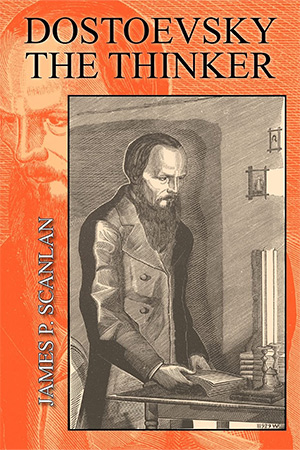 “Dostoevsky’s messianic nationalism is the most controversial feature of his intellectual outlook,” writes James Scanlan in Dostoevsky the Thinker (2002). Scanlan addresses Dostoevsky’s ideas about Russia’s messianic nationalism at length to show the progression whereby Dostoevsky went from espousing a neutral nationalism informed by appreciation of the distinctiveness of different cultures, to a more chauvinistic variety of nationalism in which he envisioned Russia as superior and not just distinctive from other cultures. Dostoevsky’s earlier theories of the native soil (pochvenichestvo) focused on how Russia was distinctively Russian, and Western ideas and institutions could not quite thrive within it. “There is in our earth something of our own, something native, that it is embedded in the natural, ancestral foundations of the Russian character and customs; that salvation lies in the soil and the people. . . . Western ideals can never wholly suit us,” writes Dostoevsky in an article from the 1860s. Although in their context these ideas were benign enough and fueled by the nationalist spirit of the earlier Romantic movement, such words have grown a great deal more problematic against the disturbing specter of violent nationalisms within our present. Words that used to mean one thing now mean something else altogether. Dostoevsky’s ideas about nationalism, his “Russian idea,” make up a spectrum. At some point he transitions from the native soil ideology to a greater and more aggressive form of nationalism, which ostensibly positions Russia in a savior role for other nations, due to what Scanlan identifies as Dostoevsky’s faith in the Russian capacity for fraternal love and universality.
“Dostoevsky’s messianic nationalism is the most controversial feature of his intellectual outlook,” writes James Scanlan in Dostoevsky the Thinker (2002). Scanlan addresses Dostoevsky’s ideas about Russia’s messianic nationalism at length to show the progression whereby Dostoevsky went from espousing a neutral nationalism informed by appreciation of the distinctiveness of different cultures, to a more chauvinistic variety of nationalism in which he envisioned Russia as superior and not just distinctive from other cultures. Dostoevsky’s earlier theories of the native soil (pochvenichestvo) focused on how Russia was distinctively Russian, and Western ideas and institutions could not quite thrive within it. “There is in our earth something of our own, something native, that it is embedded in the natural, ancestral foundations of the Russian character and customs; that salvation lies in the soil and the people. . . . Western ideals can never wholly suit us,” writes Dostoevsky in an article from the 1860s. Although in their context these ideas were benign enough and fueled by the nationalist spirit of the earlier Romantic movement, such words have grown a great deal more problematic against the disturbing specter of violent nationalisms within our present. Words that used to mean one thing now mean something else altogether. Dostoevsky’s ideas about nationalism, his “Russian idea,” make up a spectrum. At some point he transitions from the native soil ideology to a greater and more aggressive form of nationalism, which ostensibly positions Russia in a savior role for other nations, due to what Scanlan identifies as Dostoevsky’s faith in the Russian capacity for fraternal love and universality.
Scanlan documents moments in Dostoevsky’s writing where his thought takes even darker turns, showing how the author came to see Russia not only as superior to the West but also as a dominant actor among other Slavic peoples. For those witnessing Russia’s violent aggression on Ukraine and the Russian president’s denial of Ukrainian identity in favor of the deluded notion of an original, medieval Russian state, these ideas ring disturbingly familiar and relevant. What is perhaps even more problematic, for those readers who, like myself, may find Dostoevsky’s ideas about love, acceptance, and brotherhood compelling, is that many of those positive ideas are not completely divorced from the author’s darker notions. Eventually, the author came to see Russia as having unique and special access to the Christian ideals he enshrined in his art and, at least in theory, grew comfortable with the possibility of Russia using force to achieve its broader messianic goals of extending those ideals to other nationalities.
Scanlan’s monograph originally came out in 2002, over twenty years prior to the Russian aggression in Ukraine. Since then, his scholarly exploration of Dostoevsky has grown even more urgently significant. Scanlan’s read on Dostoevsky, his own reader on the margins of the author, rings far too positive in our time. “His nationalism was undeniably flawed,” writes Scanlan of Dostoevsky, “yet, as I shall try to show, it was not inconsistent with his understanding of the ideal of Christian love and brotherhood.” Although Scanlan exposes so many of the problematic ideas of Dostoevsky, his original intention is not to indict. He writes from a place of seeing the writer’s intellectual evolution and not knowing what horrors could be possible, what horrors could be justified through Dostoevsky’s ideas. Dostoevsky probably also didn’t know, although he delved extensively into the psychology of human evil.
Some version of Dostoevsky’s messianic Russian nationalism publicly informs the ideological underpinnings and public justification of Russia’s violent mission in Ukraine. The Russian government has shown no regard for Ukraine’s territorial boundaries and deployed the language of Orthodox Slavic brotherhood to justify Russia’s present neo-imperial territorial conquest. In February, during his two-hour-long tirade of an interview with Tucker Carlson, Vladimir Putin once again denied the historical existence of Ukraine, which he falsely announces as having been constructed by Lenin. When asked to expound upon Russian identity, Putin talked about Russia’s distinctiveness from the West and named Dostoevsky, a writer popular in the West, as someone who most clearly understood the Russian soul. The Russian government thus also positions itself and its opinions on the margins of Dostoevsky.
I can’t and won’t give up Dostoevsky precisely because Putin doesn’t get to claim him as his own.
Dostoevsky the nationalistic thinker is Putin’s Dostoevsky, and this Dostoevsky reads intolerably these days. But Dostoevsky himself insists on not looking away from uncomfortable truths: so we must also see all of his personas, if we are going to approach his ideas in our time. The Kremlin seems to be latching on to—and seeking to possess—everything Russian so it may advance its pernicious agendas: to colonize the past, present, and future and bestow upon them certain ideological meanings. I am disturbed by how the Kremlin has attempted to possess Dostoevsky from the margins, and in my own struggle with Dostoevsky, it took Putin proclaiming him an ally and a spokesperson to make me realize that I can’t and won’t give up Dostoevsky precisely because Putin doesn’t get to claim him as his own. The Russian government has decided to anoint itself arbiter of what is Russian, to possess liberally and excise anyone or any ideas that do not align with their own. Sometimes they go to great lengths to rid themselves of contradictions. Just this February they murdered Putin’s most vocal critic, Russian opposition leader Alexey Navalny.
However, to presume Dostoevsky’s allegiance to the Russian police state is to misread him, to simplify what is intentionally complex in him. Because there may be Putin’s Dostoevsky, but there is also the humanist Dostoevsky, my Dostoevsky—because the margins of Dostoevsky are capacious. I only really struggle with Dostoevsky because knowing that there are profoundly problematic and outright harmful ideas in his writing, I also believe Dostoevsky’s works to be overwhelmingly and miraculously insightful.
* * *
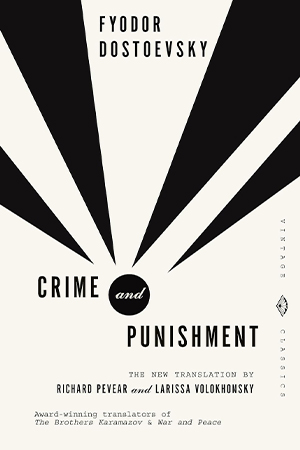 I remember going to college as a first-generation immigrant, still unsure of what college in the US really was about and making my way through political science, history, classical archaeology, and acting, wondering about philosophy and Plato—to realize that I could navigate any of these disciplines, but Russian literature provided the academic space where my passion could bridge the language barriers and cultural alienation I had to overcome in order to learn. The first thesis I ever wrote was about ethics in Dostoevsky’s Crime and Punishment, about how Dostoevsky tempts us to make moral judgments on the basis of aesthetic reasons, how he tests us ethically again and again, seeing if we engage in ethical shortcuts, if we rationalize horrible means to justify an imagined greater good. Dostoevsky is how I started to think about moral judgment in the first place, about how we treat others. Dostoevsky introduced for me the idea that sometimes we might treat others better than they’ve ever treated us to preserve our own moral integrity and dignity, to avoid moral injury for ourselves.
I remember going to college as a first-generation immigrant, still unsure of what college in the US really was about and making my way through political science, history, classical archaeology, and acting, wondering about philosophy and Plato—to realize that I could navigate any of these disciplines, but Russian literature provided the academic space where my passion could bridge the language barriers and cultural alienation I had to overcome in order to learn. The first thesis I ever wrote was about ethics in Dostoevsky’s Crime and Punishment, about how Dostoevsky tempts us to make moral judgments on the basis of aesthetic reasons, how he tests us ethically again and again, seeing if we engage in ethical shortcuts, if we rationalize horrible means to justify an imagined greater good. Dostoevsky is how I started to think about moral judgment in the first place, about how we treat others. Dostoevsky introduced for me the idea that sometimes we might treat others better than they’ve ever treated us to preserve our own moral integrity and dignity, to avoid moral injury for ourselves.
Dostoevsky shows many of his characters speaking past one another, using language to provoke or insult one another. Often this verbal violence serves as the inevitable prelude to real and disturbing acts of violence in his books. And violence is omnipresent in Dostoevsky’s novels, marking virtually all the stories he tells. Perhaps for this reason, few authors are as adept at showing how we are marked by violence. Dostoevsky shows us that everything we do to others that is immoral, we carry within ourselves too—we carry it in our memory of ourselves, even if in the margins of our memory. We become our actions, which once actualized may mean something very different than our anticipatory fantasy of them in our minds. Historically, Crime and Punishment has been a book that my undergraduate students engage with most closely and find the most accessible. In Crime and Punishment, Dostoevsky sucks you in, he engages in ethical games with the reader, and students ride this rollercoaster. In the novel, a man dreams of murder as power, driven by an illusory altruistic motive, but the murder he carries out proves nothing more than blunt force and inhumanity—it cuts him off from the human family. Without lapsing into needless collective-guilt theories, witnessing Russian violence in Ukraine, I cannot help but think, having read Dostoevsky, that the story of this country and this culture will be marked by this violence carried out and seemingly sanctioned in its name.
Dostoevsky tests us ethically again and again, seeing if we engage in ethical shortcuts, if we rationalize horrible means to justify an imagined greater good.
For as loud as Dostoevsky’s novels can be, what most drew me to them were the quiet moments in his works: a silent bow, a silent unexplained kiss, or an attempt to comfort someone. The strange premonitions encoded within the silence of gestures are a higher language in a world where language doesn’t always function in a communicative or comforting manner. The quiet syntax of gestures emerges in the moments of greatest horror, when moral and human laws have been so grossly violated, or are about to be, that the volatility of the word can do nothing to stop harm. Such moments pull us into a higher existential state of being. When describing how he feels before an epileptic fit, Dostoevsky’s Myshkin from The Idiot talks about how “all his agitation, all his doubts, all his worries were as if placated at once, resolved in a sort of sublime tranquility, filled with serene, harmonious joy, and hope, filled with reason and ultimate cause.” Shortly thereafter, he notes how “these moments, these glimpses were still only a presentiment of that ultimate second (never more than a second) from which the fit itself began. That second was, of course, unbearable.” I read Dostoevsky for this fragile calm, for moments that were greater than language, because English did not fully belong to me when I first discovered him.
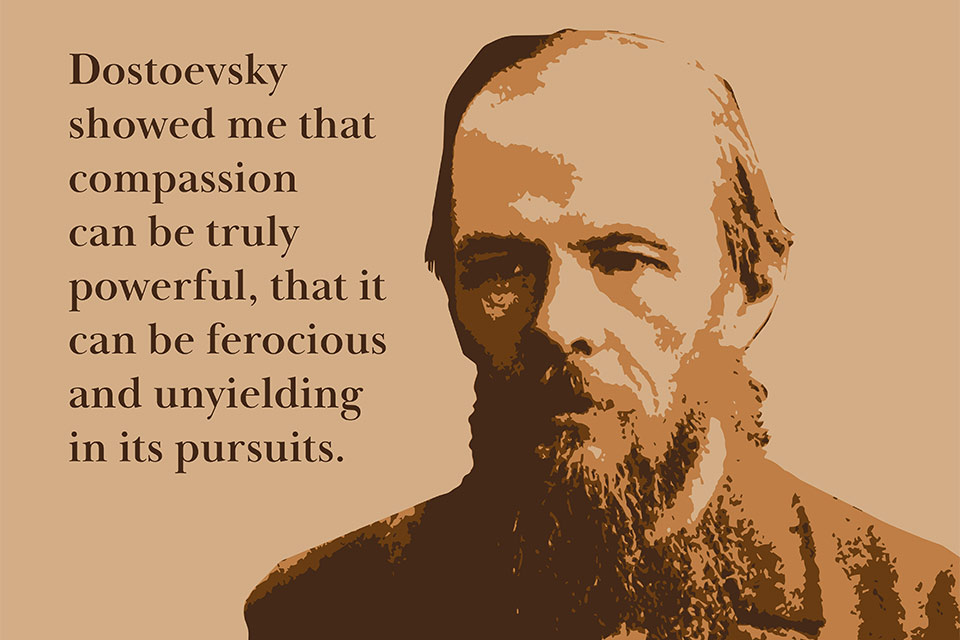
These moments in Dostoevsky cut through language for me, reaching for something human that is greater than cultural differences and the multilingual chaos of immigration. In these moments Dostoevsky showed me that compassion can be truly powerful, that it can be ferocious and unyielding in its pursuits. This Dostoevsky, my Dostoevsky of the margins, lives on inside me, the reader, and is not cancelable to me, even in our era, with its penchant for canceling books and authors. My Dostoevsky looks at Bucha and Mariupol and writhes in moral revulsion—he rises up to demand accountability, although his faith in systems is so minimal that there’s no roadmap for where that accountability might come from, but I can readily point to The Hague myself. I’m not interested in the cult of Dostoevsky, but I am interested in a writer that lets the reader make their own judgments. That personal path of making meaning was at the essence of my liberal arts journey, a course of study that Putin hates and has done everything in his power to suppress in Russia, including shutting down Smolny College of Liberal Arts in St. Petersburg. If I would venture to guess, he hates the liberal arts because they train the person to navigate any ideological landscape and make up their own mind, and authoritarians do not have any use for independent thinking. Dostoevsky was my liberal arts guide in that he trained the reader on the margins in me, he trained that reader to read anything at all critically: data, texts, tweets, Putin’s press releases and falsehoods, and even Dostoevsky himself. Dostoevsky fostered in me the desire and the freedom to think for myself, and even to denounce him when it means embracing indecency.
My Dostoevsky is compelling in his capacity for compassion, and not from some canonical height at the expense and erasure of other authors. That Dostoevsky has given me permission to hate him if I must, to be free of all ideological influences, including his own. He’s even given me permission to denounce Putin’s Dostoevsky. But Putin is a poor reader, and Dostoevsky doesn’t belong to him. I choose to hold on to Dostoevsky, to have him belong to me and all of us too, for that reason above all.
University of Kansas
Editorial note: The March 2023 issue of WLT included a cover feature on “The Russophone Literature of Resistance,” guest-edited by Kevin M. F. Platt and Mark Lipovetsky.
